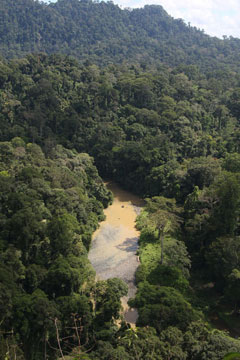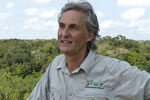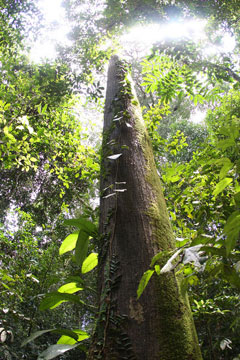Prince Charles renewed his call to protect rainforests for the services they provide humanity.
Speaking Wednesday at a black-tie dinner in London, Charles compared the need to protect forests to fighting a war.
"I often use the analogy of war because I fear we are engaged in a battle of survival. We must mobilize ourselves, indeed the whole world, with that real sense of wartime urgency and resolve to act together," said the prince, who has become a vocal advocate for forest conservation and is the founder of the Rainforest Project, an organization that seeks to slow deforestation through climate policy and by working with forest stakeholders.
The market could save forests
Charles said that by valuing the services healthy forests provide, the market, not philanthropists, could be the saviour of rainforests.

|
"The simple fact is that we are not paying for the services the forests provide. After all, everyone accepts the necessity of paying
for water, gas and electricity. But we are not paying for the world's greatest public utility of all – the one provided by the tropical rainforests – and, as a result, we are in imminent danger of losing it," he said.
"I know that we are meeting at time when short term economic problems have become acute. And you might think it extremely odd, let alone mildly eccentric, to be asking the private sector to focus on what may appear to be tomorrow's problem," he continued.
"But cost effectiveness is even more important during financial hard times and the whole point about halting deforestation is that, along with improved energy efficiency, it is the most cost effective, and immediate, way to fight climate change."
He told guests — dozens of whom were CEOs and financiers — that London's financial firms could play a key role in building a market for ecosystem services.
Stanley Fink, retired Deputy Chairman of Man Group, a hedge fund, agreed.
"The City of London is famous throughout the world for its inventiveness and its ability to seize opportunities early – and it is these skills that we desperately need now. London's financial institutions have the power to make the whole difference in the battle against climate change." Fink added in a statement: "The City of London is the financial centre of the world. His Royal Highness has challenged us to earn the right to continue to be recognized as such in the future. Valuing the services of our rainforests will not only require innovation in market-based mechanisms but also unprecedented global cooperation between the brightest minds of the nations of the world."
Related
 |
Markets could save rainforests: an interview with Andrew Mitchell
(8/17/2008) Markets may soon value rainforests as living entities rather than for just the commodities produced when they are cut down, said a tropical forest researcher speaking in June at a conservation biology conference in the South American country of Suriname. Andrew Mitchell, founder and director of the London-based Global Canopy Program (GCP), said he is encouraged by signs that investors are beginning to look at the value of services afforded by healthy forests.
Investors seek profit from conserving rainforest biodiversity
(8/13/2008) An investment firm has launched the first tropical biodiversity credits scheme. New Forests, a Sydney, Australia-based company, has established the Malua Wildlife Habitat Conservation Bank in Malaysia as an attempt to monetize rainforest conservation. The “Malua BioBank” will use an investment from a private equity fund to restore and protect 34,000 hectares (80,000 acres) of formerly logged forest that serves as a buffer between biologically-rich forest reserve and a sea of oil palm plantations. The conservation effort will generate “Biodiversity Conservation Certificates”, the sales of which will endow a perpetual conservation trust and produce a return on investment for the Sabah Government and the private equity fund.
 |
U.S. climate policy could help save rainforests
(5/14/2008) U.S. policy measures to fight global warming could help protect disappearing rainforests, says the founding partner of an “avoided deforestation” policy group. In an interview with mongabay.com, Jeff Horowitz of the Berkeley-based Avoided Deforestation Partners argues that U.S. policy initiatives could serve as a catalyst for the emergence and growth of a carbon credits market for forest conservation. REDD or Reducing Emissions from Deforestation and Degradation is a proposed policy mechanism that would compensate tropical countries for safeguarding their forests. Because deforestation accounts for around a fifth of global greenhouse gas emissions, efforts to reduce deforestation can help fight climate change. Forest protection also offers ancillary benefits like the preservation of ecosystem services, biodiversity, and a homeland for indigenous people.
 |
Investing to save rainforests
(4/2/2008) Last week London-based Canopy Capital, a private equity firm, announced a historic deal to preserve the rainforest of Iwokrama, a 371,000-hectare reserve in the South American country of Guyana. In exchange for funding a “significant” part of Iwokrama’s $1.2 million research and conservation program on an ongoing basis, Canopy Capital secured the right to develop value for environmental services provided by the reserve. Essentially the financial firm has bet that the services generated by a living rainforest — including rainfall generation, climate regulation, biodiversity maintenance and carbon storage — will eventually be valuable in international markets. Hylton Murray-Philipson, director of Canopy Capital, says the agreement — which returns 80 percent of the proceeds to the people of Guyana — could set the stage for an era where forest conservation is driven by the pursuit of profit rather than overt altruistic concerns.
Private equity firm buys rights to ecosystem services of Guyana rainforest
(3/27/2008) A private equity firm has purchased the rights to environmental services generated by 371,000 hectare rainforest reserve in Guyana. Terms of the deal were not disclosed, but the agreement is precedent-setting in that a financial firm is betting that the services generated by a living rainforest — including rainfall generation, climate regulation, biodiversity maintenance and water storage — will eventually see compensation in international markets.
